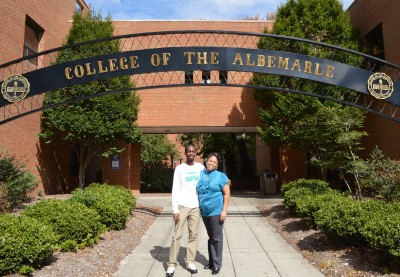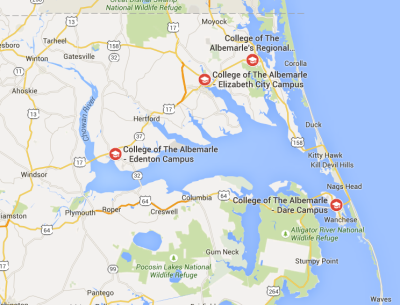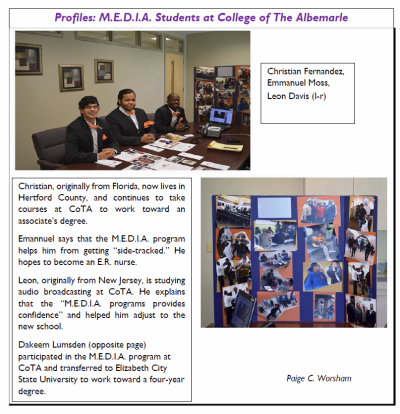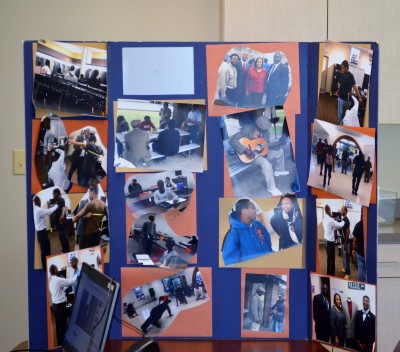College of The Albemarle: M.E.D.I.A. (Men of Excellence and Distinction in the Albemarle)
College of The Albemarle’s Elizabeth City campus is the only one of its campuses to offer a program called M.E.D.I.A. (Men of Excellence and Distinction in the Albemarle). M.E.D.I.A.’s inaugural class was inducted in 2012. The program is designed for minority males and provides them with critical academic, personal, social and professional support. The program in founded on members achieving four principal goals: 1.) completion of developmental courses, 2.) persistence from semester to semester, 3.) graduation and earned credential from College of The Albemarle, and 4.) successful transfer to a four-year institution or into the workforce.1

Several M.E.D.I.A. workshops are offered, some optional and some mandatory, that address essential topics. For example, one workshop helps members understand the importance of their personal brand created through social media and the long-term impact, whether positive or negative, that brand can have. Other relevant workshops include counseling on personal appearance, personal finance, time management, and civic engagement and volunteerism. All M.E.D.I.A. members must be drug-free during their entire course of studies and must dress presentably. M.E.D.I.A. members are fitted for and provided new suits, free of charge, and are required to wear the attire on certain occasions. M.E.D.I.A. members say the way they feel in the suit and the positive attention they receive has not only boosted their self-esteem, but has motivated them to achieve success in the different areas of their lives.2

M.E.D.I.A. members also have access to two different centers on campus. One is a tutoring center that members say is used up to three times per week on average and the other is a test preparation center that helps members prepare for and take tests effectively. M.E.D.I.A. members are offered opportunities to travel across North Carolina as well as to other states. This is something some of the students have never done before, and the experience is invaluable to broadening their horizons and enriching their perspectives.3
One student said that being part of M.E.D.I.A. gave him confidence and helped him find the commitment he lacked in terms of his education.
Personal stories from students participating in the M.E.D.I.A. program are very motivational. One student said that being part of M.E.D.I.A. gave him confidence and helped him find the commitment he lacked in terms of his education. He not only finished his first year but re-enrolled for the second year. Other participants shared that their relationship with a student or faculty mentor was critical in increasing their personal interest in their education. The expectation of checking in with someone teaches students a valuable lesson in accountability, making students responsible for going to class and working for the grades they deserve.
Students also said that M.E.D.I.A. taught them they were capable of reaching for high aspirations. For example, when one student earned a B in a course, he resolved to make it an A and made sure he did everything in his power (speaking with the professor, using the tutoring center, etc.) to earn an A. In many instances, the students pointed to the M.E.D.I.A. staff as instrumental to their success. When the staff is supportive and accessible, it sends the message that students have resources in their corner and a team of people encouraging them.4
Anecdotal evidence from staff and student interviews gives the impression that the M.E.D.I.A. initiative has been successful in increasing attainment numbers among minority males at College of The Albemarle. However, actual attainment data may not always reflect the reality of achieving success, particularly at the community college level. For example, a student may take one welding course but never receive a credential. That same student may find work that pays a decent wage, but the student does not appear in the data as holding a credential or degree. However, the community college has been successful in terms of retraining and providing that student with an applicable skill set.5

Therefore, while the M.E.D.I.A. initiative may enjoy great anecdotal success, it still must produce measurable statistics to illustrate success in quantitative data. The program is still new and will need to establish both quantitative and qualitative benchmarks to determine the positive impact on its students. Key quantitative benchmarks identified include retention, transfer, graduation rates, job placement, developmental courses taken and completed, and progression through academic programs. Qualitative metrics identified include self-image, critical reflection, societal perception, and student attitude and behavior toward the institution.6
These benchmarks, both quantitative and qualitative, can be translated into important metrics that can be used to secure funding. Funding is a constant challenge for M.E.D.I.A. and other programs like it. Therefore, securing a reliable funding stream will allow M.E.D.I.A. to continue engaging one of the most traditionally underserved demographics in our educational system. In addition, as the program expands, student members seek to launch a M.E.D.I.A. website, radio station, and TV program to reach a larger membership.7
M.E.D.I.A. is the first of its kind of student program at College of The Albemarle. Initial funding for the program was earmarked more broadly for all students from a low socioeconomic background. Ultimately, the M.E.D.I.A. program was developed and refined to target minority males specifically. While College of The Albemarle does not have a specific program for minority females, there is an effective, but informal, mentoring network on campus for minority females that is modeled after M.E.D.I.A. The aspiration of college faculty and staff is to expand M.E.D.I.A. by formalizing a partner program designed for minority females.
Introduction Part One Part Two Part Three
Promising Programs Statewide: Fayetteville State University
Promising Programs Statewide: Elizabeth City State University
Michelle Goryn is a writer and public policy consultant in Raleigh, NC.
Paige C. Worsham is Senior Policy Counsel with the North Carolina Center for Public Policy Research and conducted the interviews and convenings for this project.
The N.C. Center for Public Policy Research is grateful to numerous, generous supporters. Major funding for this project is provided by the Lumina Foundation for Education, with additional funding from the James G. Hanes Memorial Fund, and the Hillsdale Fund.
- M.E.D.I.A. brochure, College of The Albemarle. ↩
- Interview with Maenecia Lewis Cole, former director of M.E.D.I.A. at College of The Albemarle, and College of The Albemarle students. ↩
- Ibid. ↩
- Ibid. ↩
- Ibid. ↩
- M.E.D.I.A. brochure, College of The Albemarle. ↩
- College of The Albemarle Interview, note 2 above. ↩


